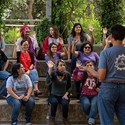Quality Enhancement Plan (QEP)
 QEP Goal:
QEP Goal:
The goal of the NVC QEP is to equip students with Information Literacy skills that will show them how to Find, ethically Use, Synthesize, and Evaluate information in their classes and in their co-curricular programs.
The NVC QEP focuses on four student learning outcomes:
Outcome 1: Students will be able to efficiently and effectively Find reliable and relevant sources to meet their information needs by using library and various information sources appropriately to explore a topic.
1a. Students will be able to find and use College and student services to meet their academic and personal needs.
Outcome 2: Students will be able to Use information ethically and effectively by applying appropriate citation/documentation systems to demonstrate understanding of relevant economical, legal, and social issues.
Outcome 3: Students will be able to Synthesize credible resources to effectively accomplish a specific purpose.
3a. Students will be able to Synthesize student and college services by gathering and integrating resources into an ePortfolio.
Outcome 4: Students will be able to Evaluate information and sources through identification of bias, authority, relevancy and credibility as it pertains to their information needs.
|
QEP Mission The Quality Enhancement Plan is linked to Creating Opportunities for Success in the following ways:
|
QEP Objectives The SACS requirements for the Quality Enhancement Plan are:
|
|
SACS Resources |
QEP Information
|
The topic was created with input from faculty, staff, students and the college stakeholders and aligns with the college mission and goals. It reflects NVC's culture, values and expectations of educational excellence.
The Process for Selection was inclusive and related to strategic planning:
- NVC held 6 faculty and staff town hall meetings where QEP topic selection was discussed and voted on (results of Town Hall meeting available on SharePoint)
- After the Town Hall meetings, an online questionnaire was sent out to attendees to help narrow and focus the topic selection from the Town Hall meetings
- Research of internal and external data points was conducted based on feedback from questionnaire (looking at outside institutions and current research)
- A review of the strategic plan was conducted and the focus on the topic included alignment with Strategic Effort 2 - Learning, Learning Outcomes.
- The QEP Steering Team was created and based on the Town Hall meeting results, selected Information Literacy as a potential QEP topic.
- The QEP Steering Team presented the initial proposed topic to the NVC Eteam
- The Steering Team developed a survey for students (SDEV, Student Leaders, Phi Theta Kappa/MASA, students in Learning Communities)
- Along with the Student Survey, QR Codes table toppers were placed on campus to help notify students of the survey. Students were also offered the opportunity to place their name in for a drawing when they completed the survey
- A survey of Full time faculty, staff and adjuncts was conducted with almost 100% Full time faculty responding. The survey required comments from respondents.
- A survey of stakeholders was conducted with a large number of responses gathered. The survey required comments from respondents.
Broad Based Involvement:
All members of the College community, including alumni, business partners, and community members, participated in the planning process of the QEP and are invited to continually participate in the QEP as it evolves. One of the many questions asked before finalizing the topic of Information Literacy was what makes this QEP ideal for NVC's conditions, population, and challenges? The qualities, characteristics and values of the organization are clear from the mission statement. The focus on collaboration, diversity, student-centeredness and shared leadership all support the distinctiveness of NVC's educational approach. This is further supported by the NVC vision statement which states that NVC creates "exemplary models for learning."
The NVC culture is a perfect environmental fit for an Information Literacy initiative because of the many benefits that will be received by faculty, staff, community members, and students both today and in the future:
- The QEP touches all students: On campus, extension campuses, and Distance Learning students;
- The QEP establishes intentional learning - having the entire campus focus on the one goal of helping NVC students become Information Literate;
- The QEP develops transformative use of information - asking our faculty and staff to critically consider how students will benefit from obtaining Information Literacy skills;
- The QEP creates crucial social and personal skills in the digital age - NVC students are young. They are developing an online identity. Helping manage this distinct social aspect of Information Literacy is a role the entire community can participate in and help shape;
- The QEP develops discerning scholars and autonomous, lifelong learners. A concerted effort to bridge the gap between college and the workplace will ensure that NVC students leave the College with skills that come from understanding how to manage and navigate information; and
- NVC will share progress from the QEP with faculty, students, staff, and community partners. Giving the entire community an opportunity to look over a summary of direct and indirect assessment measures will ensure transparency in the process, develop a shared goal of working to improve student success, and raise awareness of the concepts behind Information Literacy.
Assessment of the effectiveness of the QEP will be measured at both the course-level and the institutional level. Course-level assessments will involve direct and indirect measures, such as surveys, tests and rubrics. Quantitative and qualitative methodologies will be used. Institutional assessments will include survey results and assessment the ePortfolios.
In addition, the QEP will be incorporated into the college's strategic plan and become a routine element in institutional planning at both the department and the division levels.
Our response to the need to develop information literacy in the co-curriculum is to train students to best use the resources of our college including asking students to understand their role in developing their academic goals as well as their use of the advising system and the library resource center.
Timeline (more comprehensive timeline on the QEP document)
Fall 2014 Preparations for SDEV/EDUC pilot
January 2015 Training for instructors of SDEV/EDUC pilot (15 classes)
Spring 2015
- Development of the QEP Rubric with assessment team
- Preparations for Fall 2015 pilot of 15 SDEV/EDUC classes and 15 core courses in addition to 15 EDUC/SDEV courses, add 2 of each of the following:
- ENGL 1301, MATH 1442, BIOL 1308, HIST 1301, ARTS 1301
- Further refinement of strategic initiative for college and student services (group advising introduction of ePortfolio)
August 2015
- Training for faculty teaching in Fall pilot
- Assessment of Spring pilot
- Implement assessment feedback loop
- Create repository for Best Practices
October 2015 SACSCOC site visit
January 2016
- Training for Scale up
- Assessment of pilots/Consideration of SACSCOC feedback
- Scale up!
Year 1 (Planning)
- Add all items from timeline
- We came up with topic
- Working on formulating solid goals and outcomes
- Rolled out marketing plan
- Pre-pilot
- Develop assessment tool (common rubric)
- Ask for student feedback on IL Modules
- Train faculty for pilot
- Begin eportfolio development
- Develop strategic plan for Student and College Services (group advising/eportfolio)
- Consider assessment of eportfolio in Year 2
Year 2 (Piloting)
- Fall 2015 and Spring 2015 - larger pilot with EDUC 1300 and SDEV 070/071 and 5 courses
- Train all faculty on IL skills
- Include IL assessment in either EDUC/SDEV or ENGL 1301
- Assess on assessment day using common rubric
- Monitor scores on CCSEE and library data
- Begin assessment loop
- SACSCOC visit in 2015 - collect feedback and act on it
Year 3 (Full IL implementation)
QEP liaisons will be identified from each area on campus. The QEP liaison will be responsible for the following:
- Academic Area - Leading a team from their discipline to develop a discipline specific Information Literacy rubric. This rubric will be used to assess papers specific to their discipline on Assessment day each February. (Rubrics from the spring 2016 assessment should be complete and ready for piloting on January 30, 2016.)
- Student Success and College Services - Helping deliver information to their respective areas concerning the implementation of the QEP. Liaisons will also help develop assessment measures for their areas.
- Training. Academic Liaisons will attend a training session on November 6th about rubric development
- All liaisons will attend two meetings with the QEP Steering Team to update the Team on QEP progress
- Liaisons will participate as members of the QEP Core Assessment Team for five years. Liaisons will attend one-two norming sessions prior to Assessment Day
- Liaisons will report results to members of their areas and adjust rubrics/plans as necessary
Strategy 1 : Reaching all Students
The QEP is designed to help all students at NVC with the acquisition of Information Literacy skills. While the initial focus is on FTIC students, Information Literacy skills will be scaffolded and delivered to students in all courses. Some instructors might be Information Literacy content experts, via the Information Literacy Academy or the Train-the-Trainer program, but all students will be taught by instructors with at least some level of training in Information Literacy. Advisors and other staff members will also be Information Literacy trained. Students in high enrollment courses (most of them also core courses) will have intensified Library Information Literacy sessions. These courses include ENGL1301, HIST1301, ARTS1301, STATS1442, and BIOL1308.
Strategy 2 : College-Wide Awareness
The NVC QEP process will involve each student and stakeholder. A college-wide awareness about what the QEP and Information Literacy (in FUSE ) is at NVC will ensure that every person is involved. Along with professional development, a media campaign will focus on an element of FUSE each month. Posters, banners, and the website will feature ways to, for example, ethically Use information.
Progress to date:
- Convocation 2014 - presentation on in FUSE and handouts from SACSCOC
- Faculty Development Day 2014- presentation on inFUSE and surveys for faculty
- Employee Development Day 2014 - speakers from Trinity University introducing concept of Information Literacy and asking each faculty and staff member to consider ways they can help
- QEP Wall August 2014- for students to gain awareness of FUSE
- Banners across campus with QEP graphic and QR code leading to more information - ongoing
- Active website - updates, new links for more information literacy information - ongoing
- Include a syllabus statement on all eSyllabus forms - Fall 2016
- Posters on campus with QEP graphic and QR code - ongoing
- T-shirts, water bottle bags, giveaways with QEP graphic - ongoing
- Train advisors to use ePortfolio and help students with functions - fall 2015
- Introduce Information Literacy concepts at New Student orientations - spring 2016
- Develop Student Success Core Team to create action plan for Student Success ePortfolio - May 2015
- Discuss FUSE with Academic Disciplines at chair meetings and at college meetings - ongoing status updates
- Develop workshops for professional development - fall 2015
- Train discipline leaders to build discipline specific rubrics for assessment of Information Literacy skills - fall 2015
- Develop discipline specific Information Literacy modules and training programs for high enrollment courses - fall 2015-2018
- in FUSE Information Literacy Skills into coursework, beginning with SDEV and EDUC courses through Information Literacy Modules (developed by our librarians) - spring 2014
Strategy 3 : Provide Professional Development to help grow the skills necessary to support student attainment of Information Literacy skills. To ensure that faculty and staff enthusiastically incorporate the FUSE competencies into the classroom and College environment, Professional Development will be offered with varying degrees of commitment. The QEP website will provide training modules, webinars, and offer times and places where face-to-face training sessions will take place.
- Along with workshops, modules, and the Information Literacy Academy, conferences for faculty and staff will be available (ACRL, ALA, LOEX, SACSCOC Summer Institutes) through stipends and incentive grants. Faculty who attend the Information Literacy Academy, or a conference, or participate in Train-the-Trainer sessions will be asked to present at Faculty Development Days and at a proposed NVC Information Literacy Conference (spring 2018).
- Faculty and staff can participate in the Information Literacy Academy . This 16-hour course, will offer webinars, online workshops, and face-to-face workshops taught by external speakers as well as the NVC librarians. Employees who do not participate in either the IL Academy of Train-the-Trainer courses will still be able to attend bi-monthly professional development workshops.
- Faculty and staff may enroll in Train-the-Trainer programs. In these sessions, a small group of faculty will receive intensive Information Literacy training and, in turn, train their colleagues and help deliver Information Literacy library workshops. This approach contributes to the interdepartmental cooperation and communication that is essential for the success of this plan. This 8 hour training program will be taught by NVC library faculty and staff and external content experts. Instructors and staff completing this program will help assist in the flipped classroom teaching approach to discipline specific Information Literacy sessions (high enrollment courses - ENGL 1301 ARTS 1301, HIST 1301, STATS and BIOL1308).
- Faculty and staff development will be offered twice a month throughout the fall and spring. Online workshops, training sessions with the Student Success Core team, webinars, the Library research guide, and a repository of Best Practices will be available for all faculty and staff.
- Intensive training for pilot instructors and targeted training for scaffolded course modules (ENGL, HIST, STAT, BIOL, and ARTS) is available.
- Faculty Development days will also feature Information Literacy Workshops
Strategy 4 : Information Literacy Library Sessions will be scaffolded to help students as they move through the curriculum. In the SDEV/EDUC courses, modules are already focused on helping students F ind and ethically U se information. As students move into ENGL, HIST, BIOL, ARTS, and STATS courses, the modules will be more discipline specific and focus on evaluation and synthesis skills as well. Modules will be developed with input from content experts. Modules for the sessions will be aligned to our Student Learning Outcomes and be interactive. This is a move away from the "one and done" model of library instruction. This will allow for more student-to-content interaction. The modules for each discipline are designed to help students gain Information Literacy skills through multiple points of contact across the disciplines and are taught as a part of the flipped classroom model.
Strategy 5 : Student Success. Staff members, such as advisors, will help students with Information Literacy skills by reminding them at advising sessions about the importance of keeping an ePortfolio. Students will manage, evaluate, and synthesize information about the use of college and student services through the development of an ePortfolio. The QEP Director will ensure the following takes place:
- Monthly meetings with Student Success Core team
- Development of College Services Core Team
- Staff specific training and workshops available
Strategy 6 : Baselines established at several points during the start of the QEP:
- Information Literacy skills pre-test for FTIC students
- Assessment process designed to look for Information Literacy skills in student work and on assignments
- CCSSE/CCFSSE questions
- ePortfolio checks
- Tracking Library visits
- Tracking Skill lab visits
To assess the effectiveness of the NVC QEP, students will take an Information Literacy skills test within the first week or two in their foundational course (EDUC1300/SDEV). The majority of these students are FTIC. The students who take the pre-test will be tracked and asked to complete a post-test after having completed 30+ hours of course work. Students being asked to take the post-test will be offered priority registration after completion of the test. Spring 2015, the initial pilot semester, was a success in that over 300 students voluntarily took the pre-test. This allowed for validation of the test, assessment of reliability, and time for needed modifications. Beginning in fall 2015, scores from the pre-and post-test will be used to establish baseline Information Literacy levels from which improvement may be measured. Students who took the test after being in a course that included an Information Literacy librarian taught section will be tracked to see how they compare with typical success and retention numbers from students in classes without this course.
To assess assignments and student work to see if Information Literacy skills are being enhanced:
- A baseline will be established by use of a pretest in the SDEV/EDUC courses and subsequent use of an assessment rubric. Both student work and corresponding assignments will be assessed
- A core team of assessment professionals will be trained to assess for a five year period of time. This will allow the QEP assessment process to have more consistency and produce more valid numbers
- Scaffolded training and assessment training will build on foundational work
Strategy 7 :Develop a grass-roots approach to the creation of in-house, discipline specific materials that are targeted to the NVC population:
- Ask faculty to lead the charge to develop rubrics that speak to their disciplinary needs
- Create modules that relate to the NVC student population
- Develop a bank of assignments and teaching methodologies like the flipped classroom
- Commit to helping students with ePortfolios across the College
- Create buy-in by honoring needs of specific areas and disciplines
- Identify QEP Liaisons in all disciplines to work on Core Assessment Team and lead discipline specific rubric design
Rubric Development:
Pilot year - Development of generic rubric by assessment team
Development of discipline specific rubrics
Year 1 - Continued refinement and development of rubric in disciplines (Assess for practice spring 2016)
Years 2 - 5 - Full assessment - adjust as needed
Strategy 8: Community and Stakeholder support is a major priority for the QEP. The NVC Business Leader Coaching program will grow and students who participate in these classes may be tracked for success and retention data collection.
Include our constituents - the community, business leaders, etc and introduce ePortfolios.
- Keep the web site updated with information about our QEP successes and challenges and actions plans
- Recruit a community or business partner to take part in assessment day
- Scale up the NVC Business Leader program to help students with job skills and managing their Information Literacy needs.
Interventions are planned for the end of each assessment measure. All areas of the College participate in annual planning and review to ensure continuous improvement. The Academic areas engage in strategic review at the August Faculty Development Day session. Broad based assessment and interventions to assure measures are successful are a key strategy of the NVC QEP.
- There has been broad-based involvement in the development of the plan;
- A significant topic has been selected that focuses on student learning outcomes;
- Sufficient resources have been identified to initiate, implement, sustain and complete the QEP;
- Specific goals have been identified for the plan, including goals for student learning outcomes;
- There is an assessment plan for the QEP that will monitor how its goals are being achieved
A QEP is a five-year action plan developed by the college community to improve an aspect of student learning and/or the environment for student success. The QEP should relate to the mission of the College.
NVC is in agreement with the American Library Association (ALA) in believing that Information Literacy is “a set of abilities requiring individuals to recognize when information is needed and have the ability to locate, evaluate, and use effectively the needed information.”
While Information Literacy skills are most assuredly being taught in classes across campus, there is no coordination of how these skills and concepts are integrated into the curriculum or a check to see if our students are, indeed, gaining the best Information Literacy skills to position them for their future goals.
By focusing our QEP on Information Literacy students will benefit by obtainment of stronger research and writing skills, critical thinking skills, and a broader knowledge of how to manage all the information students need from our college services. A collaborative effort between faculty, students and staff regarding Information Literacy skill building will naturally help students as they develop their academic and career profile during their time at our college.
Information Literacy skills are critical as a way to help students not only in the classroom, but as a means to effectively research graduate and professional programs and to guide them as they determine possible career paths.
Title: inFUSE
Topic: Information Literacy
The goal of the NVC QEP is to equip students with Information Literacy skills that will show them how to Find, ethically Use, Synthesize, and Evaluate information in their classes and in their co-curricular programs.
The NVC QEP focuses on four student learning outcomes:
Outcome 1: Students will be able to efficiently and effectively Find reliable and relevant sources to meet their information needs by using library and various information sources appropriately to explore a topic.
1a.Students will be able to find and use College and student services to meet their academic and personal needs.
Outcome 2:Students will be able to Use information ethically and effectively by applying appropriate citation/documentation systems to demonstrate understanding of relevant economical, legal, and social issues.
Outcome 3:Students will be able to Synthesize credible resources to effectively accomplish a specific purpose.
3a. Students will be able to Synthesize student and college services by gathering and integrating resources into an ePortfolio.
Outcome 4:Students will be able to Evaluate information and sources through identification of bias, authority, relevancy and credibility as it pertains to their information needs.
What we are going to do to ensure these goals are met:
Scaffolded Information Literacy Library sessions
Introduce students to the ePortfolio in group advising and have them begin to develop an ePortfolio in EDUC/SDEV courses as a way to synthesize and manage college resources
Training for EDUC Instructors on how to clearly communicate elements of Information Literacy into assignments
Pretest for all EDUC students and posttest once they reach 30 plus hours of coursework?
Assessment of student work using discipline specific rubrics.
Professional development for faculty and staff.
How to Assess:
Assess student work with a common rubric that looks for Information Literacy skills
Assess assignments to help clearly identify Information Literacy requirements
Assess ePortfolios to see if students are using college resources effectively
Watch CCSSE surveys for items identified as relating to Information Literacy
Watch for scores in Program Assessment relating to Information Literacy
Look for ways to improve based on assessment cycle.
Mission of Northwest Vista College:
Northwest Vista College creates opportunities for success by offering quality academic, technical and life-long learning experiences to its diverse communities in a collaborative, student-centered, data-informed and shared leadership environment.
The QEP is linked to the following essential institutional activities:
- Opportunities for students by enhancing student learning outcomes through improved teaching methodologies in Information Literacy skill building
- improved library and learning resources
- establishment of ePortfolios for use in both assessment and college resources such as advising
QEP stands for Quality Enhancement Plan. The QEP is a required initiative that outlines a new, long-term program chosen by this college to enhance learning for you - our student. A QEP is designed to complement existing programs, strengthen student learning outcomes, and support the mission of the institution.
The NVC Quality Enhancement Plan (QEP) will help students learn how to find, ethically use, synthesize and evaluate information in their classes and reinforce those skills in their co-curricular programs.
We call our QEP Improving Information Literacy through in FUSE because we want you to be in FUSE d with Information Literacy skills and we feel each part of the term in FUSE is important.
The NVC QEP The definition of an information literate person extends beyond school and the application to academic problems--such as writing a research paper--and reaches right into the workplace.
The ability to use information effectively to Find and manage information, and the ability to critically evaluate and ethically apply that information to solve a problem are some of the hallmarks of an information literate individual. Other characteristics of an information literate individual include the spirit of inquiry and perseverance to find out what is necessary to get the job done.
We live in the Information Age, and "information" is increasing at a rapid pace. We have the Internet, television, radio, and other information resources available to us 24 hours a day, 7 days a week. However, just because so much information is easily and quickly available does not mean that all of it is worthwhile or even true.
Because of resources like the Internet, finding high-quality information is now harder than ever, not easier! Finding the good stuff is not always quick! And the good stuff does not always come cheaply, either!
Core Requirement 2.12: The institution has developed an acceptable Quality Enhancement Plan (QEP) that includes an institutional process for identifying key issues emerging from institutional assessment and focuses on learning outcomes and/or the environment supporting student learning and accomplishing the mission of the institution, and
Comprehensive Standard 3.3.2: The institution has developed a Quality Enhancement Plan that (1) demonstrates institutional capability for the initiation, implementation, and completion of the QEP; (2) includes broad-based involvement of institutional constituencies in the development and proposed implementation of the QEP; and (3) identifies goals and a plan to assess their achievement.
- The QEP is part of the College’s accreditation process. The regional accrediting body, Southern Association of Colleges and Schools Commission on Colleges (SACSCOC), requires its member institutions to develop and implement a five-year plan that describes a detailed action plan that addresses a well-defined and focused topic or issue pertaining to the enhancement of student learning outcomes.
- The QEP enables achievement of the College’s mission to create a student-centered learning environment and to prepare students for a global and technological society.






